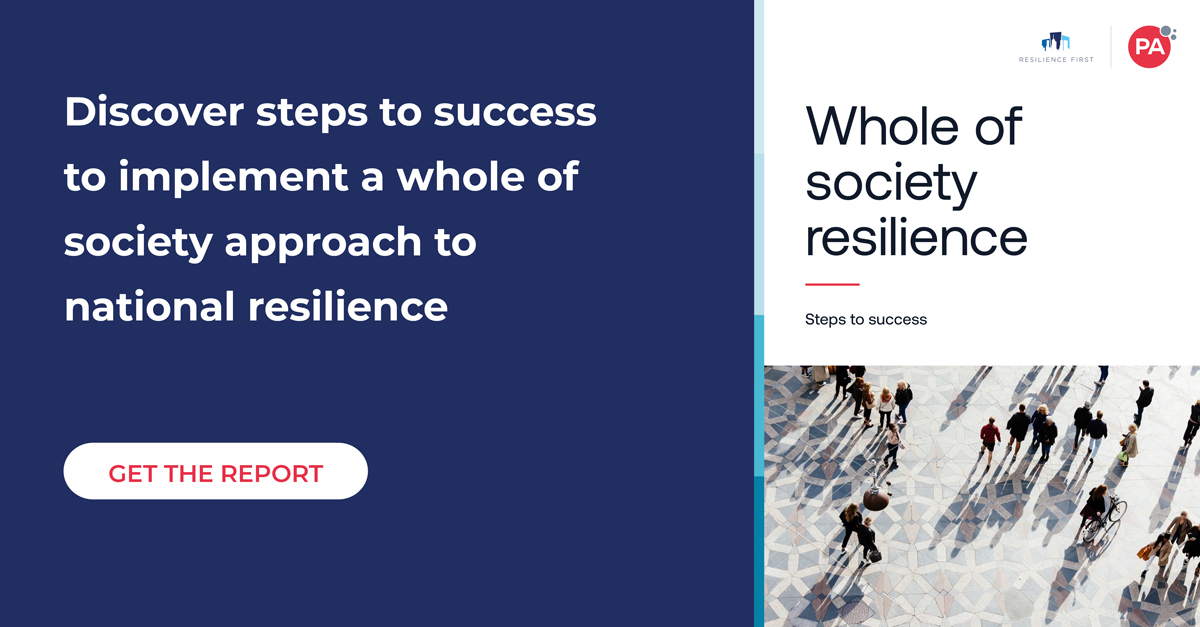by Laura Michelon, Marketing Manager, Resilience First
In February 2023 Resilience First, with PA Consulting, published a new report – Whole of Society Resilience: Steps to Success.
The report focuses on action that aligns with the UK Government's Resilience Framework ambitions to strengthen and underpin systems that provide national resilience to the threats we now face.
We are living through unprecedented volatility, disruption, and change, as evidenced by the COVID-19 pandemic, the Russian invasion of Ukraine, climate change, frequent instances of industrial action, and the current energy and cost of living crisis. The time is right to rethink our approach to resilience. The UK Government Resilience Framework (UKGRF) is a call to action for all sectors of society – from government and business to individuals – to take resilience seriously.
“If we can understand and prepare for shocks and stresses more intentionally, we can mitigate some of their impact, and ensure recovery is quicker and less costly.” Martyn Link, Executive Director, Resilience First
To achieve a truly whole of society approach we all need to play our part and work collectively. This report is the result of a discussion forum held by Resilience First with its champion member PA Consulting at the end of 2022, bringing together resilience experts and stakeholders from across government, local communities, academia, and business. The forum included a briefing from the Cabinet Office on the UK government’s approach to resilience, a panel discussion, and a workshop, with groups considering the key theme of how to achieve a whole of society approach to resilience.
“The government's framework gives us the contours of a long-term resilience strategy, but the next step is to shade in all the colours, and to give us the action plans under each of the themes. What I like about the
report is that it sets out some of the concrete specific steps that different actors can take forward to create a more resilient system.” James Heath, CEO, National Infrastructure Commission
“A whole of society approach looks to create shared ownership for our national resilience, providing the governance, guidance and incentives from the top, and community led needs and initiatives from the bottom; recognising that resilience is a positive strategic enabler underpinning the nation’s prosperity and levelling up agenda.” Caroline Field, national resilience expert, PA Consulting
The report is based on five key themes:
- Establishing wider partnerships
- Providing incentives
- Involving communities
- Building future skills
- Leveraging data and technology
For each of the themes, the report sets out the recommendations and specific actions for implementing a whole of society approach to resilience in the UK. Taking these steps will deliver a collective, co-ordinated response beyond traditional emergency approaches, that moves towards holistic resilience for both society and organisations.
1. Establishing wider partnerships
The traditional focus on emergency preparedness and response is no longer enough, developing better, more inclusive partnerships is key to evolving a holistic approach through a collective, co-ordinated effort for both organisations and wider society.
2. Providing incentives
Investment in resilience will be accelerated by the dual motivators of regulatory requirements and the ability to measure and monitor the impact of resilience building efforts. Resilience spending should be considered holistically, rather than based on individual business cases.
“We'll need to make sure we get the assurance and accountability model right; that means deciding pretty early on what are the appropriate mechanisms to monitor progress and to hold operators to account for providing the required levels of service and the required levels of investment.” James Heath, CEO, National Infrastructure Commission
“Most organisations tend to focus more on responding to emergencies rather than mitigating risk or being more proactive in terms of their resilience building. That definitely needs to change, and certainly investing in resilience has been shown to be at least six times more cost effective than recovering from disaster.” Caroline Field, national resilience expert, PA Consulting
3. Involving communities
A whole of society resilience approach requires multi-layered, locally-led engagement, where community leaders and members are part of the solution. Local stakeholders are best placed to understand the complexity of the challenges and issues in their own areas, and so should be engaged in developing the programmes that will resolve these. Engaging with communities, promoting the role of local business, and better coordination with community volunteers is essential to this process, and will require a mechanism to harness the volunteers that want to help with resilience building activities in their area.
“Thinking about everyone everywhere and raising their resilience is a challenge. There are people who are at risk, who are also vulnerable, who are unaware, who are not prepared. We need to work with partners, community groups, organisations and businesses to provide communities and individuals with support.” Professor Duncan Shaw, Professor of Operational Research and Critical Systems, National Consortium for Societal Resilience
4. Building future skills
There is growing evidence of a deepening national skills crisis in the UK. An ageing population, migration and lack of skilled workers, is having a profound impact on the nation's productivity, compounded by new technologies, including automation, that demand upskilling and reskilling of the workforce. The economy of the future will require resilience mindsets and competencies; complex problem solving, systems thinking, and an understanding of the bigger picture.
“We need to create the conditions that develop systems thinkers capable of engaging effectively with other disciplines and domains. These are people who model self-leadership and collaborative learning relationships
and have the humility and courage to engage with integrity in complex problem solving. Our legacy training and education systems simply don't produce these outcomes as learning professionals. We urgently need new measurement models and forms of assessment through which these future skills can be embedded in our training and education systems. Resilience First and PA’s report directly addresses these issues. Developing and testing case studies is where we should begin so that we can figure out what works in what context and for whom, and then transfer and scale that knowledge and know how in a playbook and not a rule book.” Professor Ruth Crick, CEO Wildlearn and Professor of Learning Analytics, University of Technology Sydney
5. Leveraging data and technology
Data and digital technologies are central to delivering whole of society resilience, as they provide both the capability and platforms for increasing our shared understanding of risk, whilst also enabling resilient decision-making. Digital infrastructure is required to move, share, and store data, much of which is privately owned, and thus vulnerable to market structures and the general health of the sector.
“Technology has the potential to transform our approach to resilience. It can enable dynamic stress testing, system manipulation, and real time understanding of the dynamics of an evolving situation. These can help identify system risks and the interconnections as well as accelerate and encourage systems thinking and adaptations. There is a perceived need for better sharing of industry best practice, particularly the resilience related role of digital, data and technology supporting preparedness, incident response, situation monitoring, decision making, and interoperability.” Steve Wreyford Hind, Digital Transformation Lead, PA Consulting
Conclusion
The mindset around resilience needs to shift, to acknowledge resilience as a strategic enabler rather than simply how we respond to the next disaster.
Recognising the value of resilience through better measurement and metrics, broad application of standards, technology driven platforms, and finally creating safe spaces for people to come together, exchange ideas and directly engage with addressing complex and multi-layered challenges will be essential to the evolution of a strategic, long-term framework for enhancing national resilience.
Moving forward, contributors to the forum, led by Resilience First, will continue to engage to develop and monitor recommendations resulting from the discussions. Resilience First will collaborate with stakeholder communities including government, business, community, and voluntary sectors to seek paths to implementation.
If your organisation is interested in getting involved, please contact Beena Chester on contact@resilience.first.co.uk




